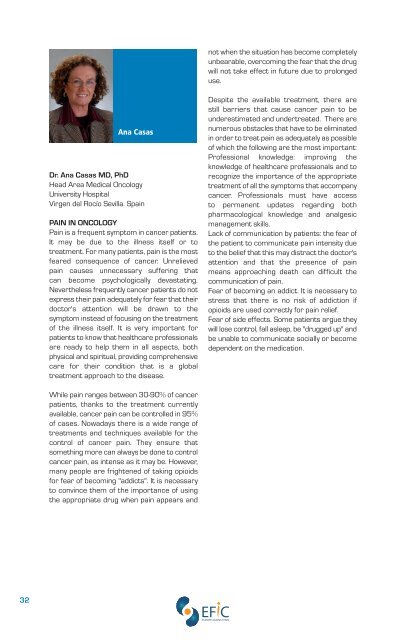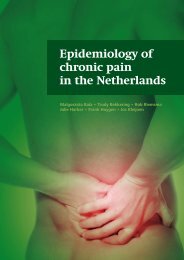First EFIC® Symposium Societal Impact of Pain - SIP
First EFIC® Symposium Societal Impact of Pain - SIP
First EFIC® Symposium Societal Impact of Pain - SIP
Create successful ePaper yourself
Turn your PDF publications into a flip-book with our unique Google optimized e-Paper software.
32<br />
Ana Casas<br />
Dr. Ana Casas MD, PhD<br />
Head Area Medical Oncology<br />
University Hospital<br />
Virgen del Rocío Sevilla. Spain<br />
PAIN IN ONCOLOGY<br />
<strong>Pain</strong> is a frequent symptom in cancer patients.<br />
It may be due to the illness itself or to<br />
treatment. For many patients, pain is the most<br />
feared consequence <strong>of</strong> cancer. Unrelieved<br />
pain causes unnecessary suffering that<br />
can become psychologically devastating.<br />
Nevertheless frequently cancer patients do not<br />
express their pain adequately for fear that their<br />
doctor's attention will be drawn to the<br />
symptom instead <strong>of</strong> focusing on the treatment<br />
<strong>of</strong> the illness itself. It is very important for<br />
patients to know that healthcare pr<strong>of</strong>essionals<br />
are ready to help them in all aspects, both<br />
physical and spiritual, providing comprehensive<br />
care for their condition that is a global<br />
treatment approach to the disease.<br />
While pain ranges between 30-90% <strong>of</strong> cancer<br />
patients, thanks to the treatment currently<br />
available, cancer pain can be controlled in 95%<br />
<strong>of</strong> cases. Nowadays there is a wide range <strong>of</strong><br />
treatments and techniques available for the<br />
control <strong>of</strong> cancer pain. They ensure that<br />
something more can always be done to control<br />
cancer pain, as intense as it may be. However,<br />
many people are frightened <strong>of</strong> taking opioids<br />
for fear <strong>of</strong> becoming "addicts". It is necessary<br />
to convince them <strong>of</strong> the importance <strong>of</strong> using<br />
the appropriate drug when pain appears and<br />
not when the situation has become completely<br />
unbearable, overcoming the fear that the drug<br />
will not take effect in future due to prolonged<br />
use.<br />
Despite the available treatment, there are<br />
still barriers that cause cancer pain to be<br />
underestimated and undertreated. There are<br />
numerous obstacles that have to be eliminated<br />
in order to treat pain as adequately as possible<br />
<strong>of</strong> which the following are the most important:<br />
Pr<strong>of</strong>essional knowledge: improving the<br />
knowledge <strong>of</strong> healthcare pr<strong>of</strong>essionals and to<br />
recognize the importance <strong>of</strong> the appropriate<br />
treatment <strong>of</strong> all the symptoms that accompany<br />
cancer. Pr<strong>of</strong>essionals must have access<br />
to permanent updates regarding both<br />
pharmacological knowledge and analgesic<br />
management skills.<br />
Lack <strong>of</strong> communication by patients: the fear <strong>of</strong><br />
the patient to communicate pain intensity due<br />
to the belief that this may distract the doctor's<br />
attention and that the presence <strong>of</strong> pain<br />
means approaching death can difficult the<br />
communication <strong>of</strong> pain.<br />
Fear <strong>of</strong> becoming an addict. It is necessary to<br />
stress that there is no risk <strong>of</strong> addiction if<br />
opioids are used correctly for pain relief.<br />
Fear <strong>of</strong> side effects. Some patients argue they<br />
will lose control, fall asleep, be "drugged up" and<br />
be unable to communicate socially or become<br />
dependent on the medication.






